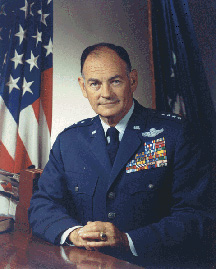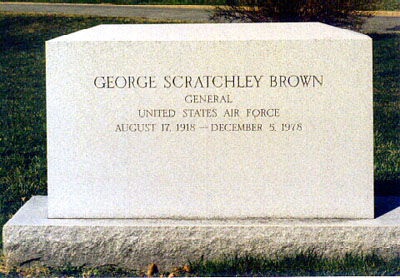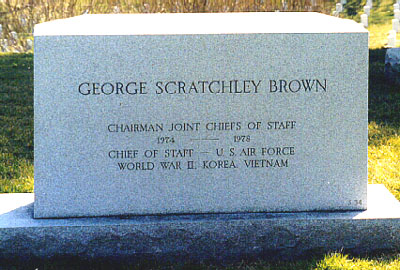Courtesy of the United States Air Force:
GENERAL GEORGE SCRATCHLEY BROWN
Retired June 21, 1978. Died December 5, 1978
General George Scratchley Brown was chairman of the Joint Chiefs of Staff, Department of Defense, Washington, D.C. In this capacity, he served as the senior military adviser to the President, the National Security Council and the Secretary of Defense. Through the commanders of the unified and specified commands, he was also responsible for executing the decisions of the National Command Authorities regarding worldwide readiness and employment of combat forces of the United States Army, Navy, Air Force and Marine Corps.
The General was born in Montclair, New Jersey. He graduated from high school in Leavenworth, Kansas, and after attending the University of Missouri for a year, he received a congressional appointment to the U.S, Military Academy, West Point, New York, in 1937.
His first assignment after flying training was at Barksdale Field, Louisiana, where as a member of the initial cadre of the 93d Bombardment Group, he flew B-24 Liberators. Moving with the organization to Ft. Myers, Florida, he flew antisubmarine patrol.
In August 1942 he flew with the 93d Bombardment Group to England, the first B-24 Group to join the Eighth Air Force. Until April 1944, he served in various positions with the group, including commander of the 329th Bombardment Squadron, group operations and then executive officer. It was as executive officer that he took part in the famous low-level bombing raid against oil refineries at Ploesti, Rumania, Aug. 1, 1943. The 93d Group was the second of five B-24 groups that raided Ploesti from a temporary base at Bengasi, Libya. The 93d group, led by its commander, flew directly into heavy defenses to hit three of the six target refineries. The lead plane and 10 others were shot down or crashed on the target. General Brown, then a Major, took over the lead of the battered 93d and led it back to Bengasi. He received the Distinguished Service Cross for his actions on that mission.
Brown was appointed assistant operations officer, 2d Air Division, in May 1944. He assumed similar duties in May 1945 with Headquarters Air Training Command at Fort Worth, Texas. In 1946 he joined Headquarters Air Defense Command at Mitchel Field, New York, as assistant to Air Chief of Staff, Operations, and later became assistant deputy for operations.
During the Korean War in 1950, he became commander of the 62d Troop Carrier Group at McChord Air Force Base, Washington, which operated between the West Coast and Japan. During 1951 and the early part of 1952, he commanded the 56th Fighter Wing at Selfridge Air Force Base, Michigan, and in May 1952 joined Fifth Air Force Headquarters at Seoul, Korea, as director for operations.
In July 1953 Brown assumed command of the 3525th Pilot Training Wing at Williams Air Force Base, Ariz. He entered the National War College in 1956, and after graduation in 1957 served as executive to the Chief of Staff, U.S. Air Force. In June 1959 he was selected to be military assistant to the Deputy Secretary of Defense, and later was military assistant to the Secretary of Defense.
Brown became commander of the Eastern Transport Air Force, McGuire Air Force Base, N.J. in August 1963. In September 1964, he was selected to Joint Task Force II, a Joint Chiefs of Staff unit formed at Sandia Base, New Mexico, to test weapon systems of all the military services.
He served as the assistant to the chairman, Joint Chiefs of Staff, in Washington, D.C., from August 1966 to August 1968. He then assumed command of the Seventh Air Force and also became deputy commander for air operations, U.S. Military Assistance Command Vietnam. As Seventh Air Force Commander, he was responsible for all Air Force combat air strike, air support and air defense operations in Southeast Asia. In his MACV position, he advised on all matters pertaining to tactical air support and coordinated the Republic of Vietnam and United States air operations in the MACV area of responsibility.
In September 1970 General Brown assumed duty as commander, Air Force Systems Command, with headquarters at Andrews Air Force Base, Maryland. General Brown was appointed by the President to be Chief of Staff of the U. S. Air Force, effective August 1, 1973, and to be Chairman of the Joint Chiefs of Staff, Department of Defense, effective July 1, 1974.
He is a command pilot.
MAJOR AWARDS AND DECORATIONS
His military decorations and awards include the Distinguished Service Medal with three oak leaf clusters, Silver Star, Legion of Merit with two oak leaf clusters, Distinguished Flying Cross with oak leaf cluster, Bronze Star Medal, Air Medal with three oak leaf clusters, Joint Service Commendation Medal and Army Commendation Medal.
From a contemporary news report:
Washington, D.C., December 5, 1982: A 4-star United States Air Force General who retired as Chairman of the Joint Chiefs of Staff, died at a hospital here today of prostate cancer. He was 60 years old.
He was first appointed by President Nixon in 1974 and was then reappointed by President Ford two years later, he was found to have cancer last February. He had been undergoing radiation treatments. He died at 5:45 P.M. at Malcolm Grow Air Force Hospital, Andrews Air Force Base, according to Brigadier General Jerry Dalton, Air Force Information Officer.
He was decorated hero of World War II and was sent by President Johnson to Vietnam in 1968 to command the US air war. Later he became Air Force Chief of Staff. He gained little public attention until after his appointment to the Joint Chiefs of Staff, when he made several controversial statements and off-the-cuff remarks that were roundly criticized and proved embarrassing to successive administrations. The first such incident occurred in October 1974 when at a Duke University seminar, he suggested that US Jews exerted undue influence in US affairs because they “own the banks in this country and the newspapers.” He went on to criticize the Jewish lobby in Congress. Then in an interview in late 1976, told a French journalist that Israel was “a burden” to the US. Also described the British military capability as “pathetic” and said that Iran was bent on restoring Persian empire. He later made a public apology for the remarks.
In March 1977, he told high-ranking military and government personnel in a lecture that Congress was being meddlesome and irresponsible in its dealings with defense and foreign aid. Despite demands for his dismissal, President Ford kept him on as Chairman of the Joint Chiefs of Staff, saying that although he deplored the remarks about Jews, the General was an outstanding soldier. There had been speculation that President Carter would dismiss him, but early in his administration made it clear that the General would stay on. The President’s press secretary, Jody Powell, said in March 1977 that Carter was “not inclined to evaluate his performance on the basis of events that took place during the previous administration.” He had served as Assistant to the Chairman of the Joint Chiefs from 1966 to 1968, when he went to Vietnam.
Born August 17, 1918, at Montclair, New Jersey, and graduated from the United States Military Academy in 1941. After flight training, he flew with the 93rd Bombardment Group to England. It was as Executive Officer of that group that he took part in the famed low-level bombing raid against oil refineries at Ploesti, Rumania, on August 1, 1943. The lead plane and 10 others were shot down or crashed on target and he then took lead to guide the group back to Bengasi, for which he received the Distinguished Service Cross.
In the Korean War he became Commander of 62nd Troop Carrier Group and 56th Fighter Wing. He also served as military Assistant to the Deputy Secretary of Defense and in 1964 was selected to organize a joint study group to test weapons systems of all the military services. His other medals included Silver Star, Legion of Merit and Distinguished Flying Cross.
He is survived by his wife, Alice, whom he married in 1942, and 3 children.
Buried in Section 21 at Arlington national Cemetery near his former Commander in Vietnam, Army General Creighton W. Abrams.
From a contemporary press report:
Alice “Skip” Brown, 77, the widow of Air Force Gen. George S. Brown, former chairman of the Joint Chiefs of Staff, died February 4, 2000 at a hospital in Boston, where she had undergone heart surgery. She lived in Alexandria.
Mrs. Brown was born in Fort Lewis, Washington. As a young woman, she was an occupational therapist. She married in 1942 and accompanied her husband to military posts in the United States. They settled in the Washington area 30 years ago. Her husband died in 1978.
Mrs. Brown was active in Colonial Dames of America, the International Neighbors Club, and the Hunting Creek Garden Club.
Survivors include three children, Dudley K. and Daniel W. Brown, both of Corrales, N.M., and Susanah B. Howland of Lincoln, Massachusetts; two brothers, Daniel W. Colhoun of Upperco, Maryland, and Howard P. Colhoun of Glyndon, Maryland.; and four grandchildren.
BROWN, ALICE COLHOUN
On Thursday, February 4, 1999, in Boston, MA, wife of the late George S. Brown, Gen., USAF (Retired); beloved mother of Dudley Kaye Brown, Daniel Warwick Brown and Susanah Brown Howland. Also survived by four grandchildren. A memorial service will be held on Thursday, February 11, 1999, at 11 a.m. at the Ft. Myer Old Post Chapel. Interment will be private. In lieu of flowers, donations may be made to the Falcon Foundation, 3116 Academy Dr., USAF Academy, CO 80840-4475.
Michael Robert Patterson was born in Arlington and is the son of a former officer of the US Army. So it was no wonder that sooner or later his interests drew him to American history and especially to American military history. Many of his articles can be found on renowned portals like the New York Times, Washingtonpost or Wikipedia.
Reviewed by: Michael Howard



